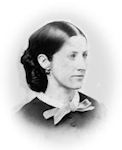Fairfax Court House, March 10, 1862.
Dear Father, — Safe in the former headquarters of General Beauregard in the house of Dr. Gunnell, once a physician here but now a surgeon in the rebel army. The house, now General Porter’s headquarters, is one of the best in this town, being built of brick and being two and a half stories in height. It stands back from the road some 300 feet, and has a straight avenue leading to it, with medium-sized trees planted on each side. Still it has the true Southern look about it, viz., the air of neglect, of something wanting to complete the estate, as if the owner had begun with the idea of making a fine place and had been stopped short for want of funds. The fences round the place are of the most common kind, such as we see in our pastures. What adds to the air of shiftlessness is a sow with a litter of a dozen pigs rooting around the trees and in what used to be a garden. She threatened to bite me to-day when I went too near her young ones, and worked upon my fears so much that I put my hand on my pistol to shoot her, but she fortunately retreated. She was a fierce and ugly creature. I offered James a quarter to catch me one of the young ones, as I wanted to see the sow run at him, but he thought it was safer to let them alone. I tried to get General Porter to let me have one killed for dinner, but he would not. You can tell when you arrive in a Southern city by seeing pigs and cattle running round in the streets. I have found it so in Washington and Georgetown.
I got about three hours’ sleep last night, being occupied in packing, and writing for the general most of the time. We had breakfast at 5 and started about 8 o’clock on our advance. We reached here about 12, having a pouring rain most of the way, from which I was well protected by my rubber coat, and cap-cover which you bought me, and which I now prize highly. I did not get a particle of my clothing damp or moist. My horse I think a great deal of. He has great powers of endurance, and was not in the slightest degree tired when we reached here, although I carried more on his back than any of the other officers. I begin to think that it was a good plan having him shaved. A few minutes after the rain was over he was as dry as when he started, while the other horses were wet and steaming. Nothing of any importance happened on the way, no rebels being seen, as they evacuated the place yesterday. Colonel Averell we found here on our arrival, he having started early in the morning. He left soon after with McDowell’s division for Centreville, which place he has reached without finding any enemy, and he is now pushing on to Manassas, which he will reach to-night. The enemy have evacuated that place too, and where they have gone no one knows. I think that McClellan had a hint from Lincoln that unless he did something within a few days his course would come to an end, and hence his speedy advance. We (P.’s division) shall probably remain here a day or two. McClellan has taken up his headquarters at this place, a few houses distant from us.
My room here is a large pleasant one, with a big open fireplace, in which I have some enormous logs burning, casting a very pleasant light over the apartment. It is occupied by Batchelder, McQuade and myself. I have my buffalo-robe blanket, and canvas bag filled with changes of clothing, etc., with me, and can get along quite comfortably with my present conveniences for three or four weeks. My trunk I left at camp in charge of one of the clerks who stays there with the guard.
As we approached Fairfax we found slight earthworks which had been hastily thrown up by the rebels some time ago, commanding all the country round the town, for some distance. They don’t amount to anything and were probably occupied by the rebel pickets some time ago. On entering the town we struck the turnpike, which is quite a decent road, and which forms the principal street of the town. The Court House is situated on it and is an old-fashioned brick building with a portico in front. We should call this a small village in Massachusetts, but here it is quite a city in the estimation of the F. F. V.’s.
I copied a report for Hendricks of the New York Herald this afternoon which you will probably see in to-morrow morning’s N. Y. H. It was amusing to hear him “get off” the usual stereotyped phrases about the enthusiasm, alacrity, etc., of the soldiers, and then hear him say “big lie,” etc., to each phrase. For instance, when he wrote about there being very few stragglers, I said I didn’t agree with him as I thought there were a good many. “Oh, I know it,” said he, “still I must write it so.” That is just the way these newspaper reporters do. All the stories about fine drill, discipline, etc., we know to be untrue half of the time. Still, on this morning’s march the soldiers did very well, as the roads were muddy and the travelling very heavy.
The troops are all bivouacked to-night and some regiments have what are called shelter tents, — small low tents, accommodating three men, and equally distributed among the three men on a march, each one carrying his share.
I am so sleepy that I must end and ask you to excuse any deficiencies in the letter on account of my being so tired.










